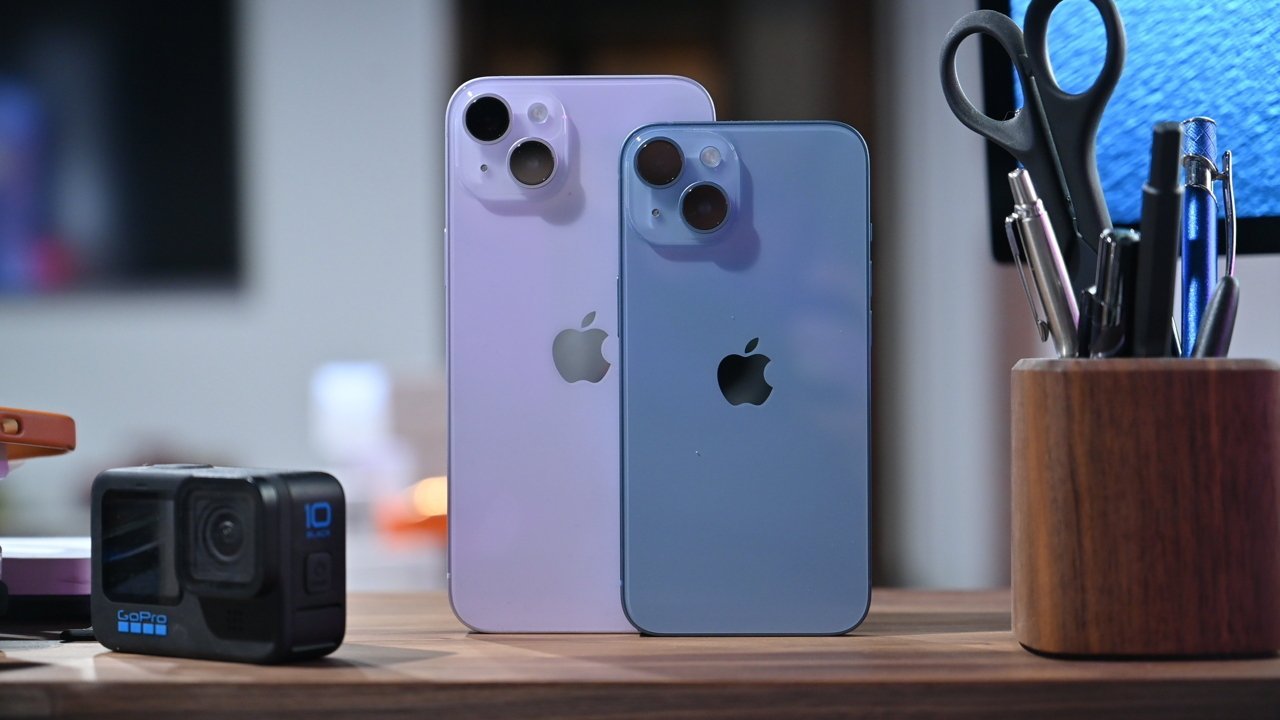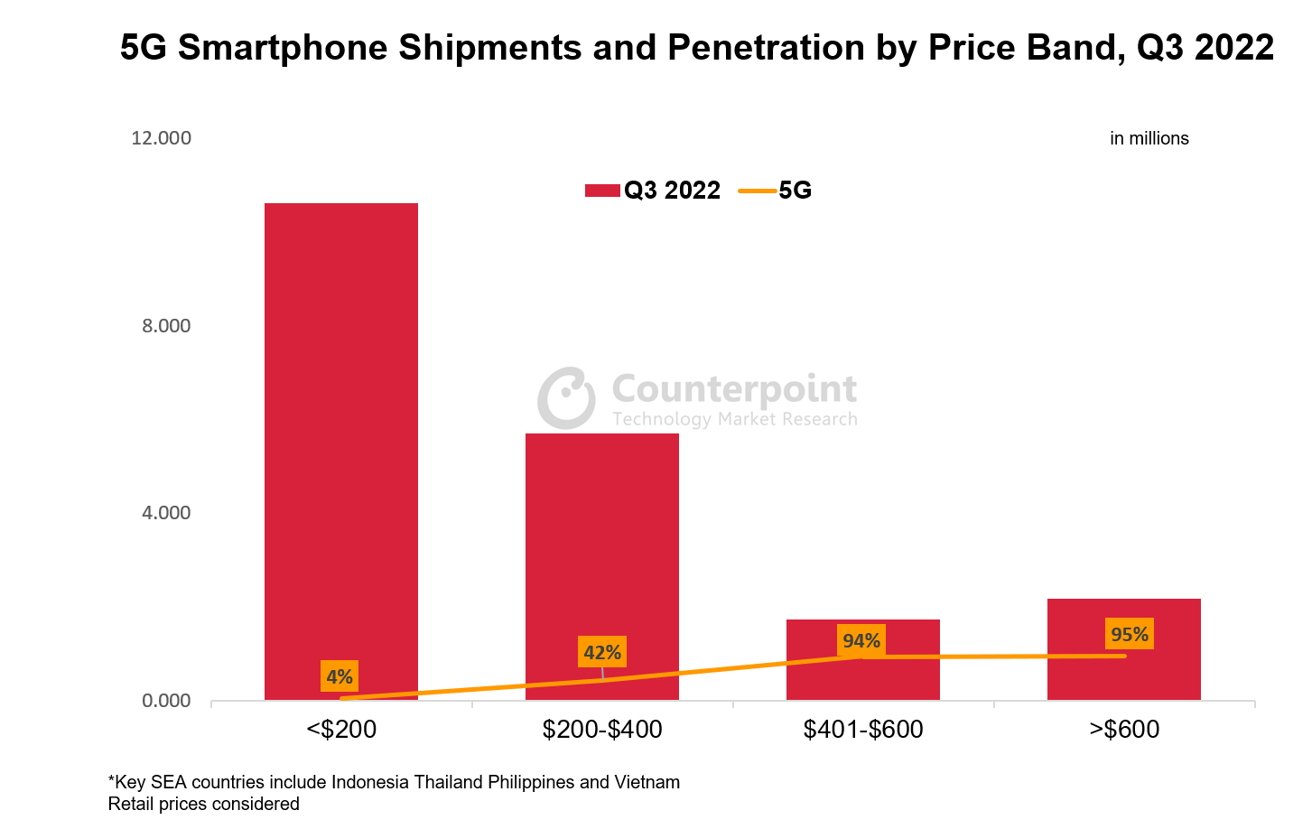iPhone not hit by Southeast Asia's collapsing smartphone market
New research claims that while total smartphone shipments dropped dramatically in Southeast Asia during the third calendar quarter of 2022, Apple's iPhone saw a 63% increase year over year.

In 2019, Apple was seeing competition in the Southeast Asia market from smartphones that were nearly always considerably cheaper than the iPhone. Today with economic pressures meaning the market dropped 10% in Q3 2022, however, Apple has continued to see a significant rise.
According to Counterpoint Research, economic uncertainty across the region is responsible for the lower than expected sales. That drop is chiefly in the phones that cost $200 or lower, though, while those premium models at $400 or greater, have done better.
Shipments of lower cost smartphones dropped 24% YOY, while premium models rose 29% over the same period.

Source: Counterpoint Research
"There were some brand-level hits and misses too in Q3 2022," writes Counterpoint Research. "While Samsung shipments fell 13% YoY, Apple's shipments were up 63% YoY across all the key countries."
Counterpoint notes that Vietnam appears to be "grabbing iPhones at a faster rate than its neighbours." Buyers in Thailand and the Philippines have reportedly been drawn to 5G, but a lack of 5G coverage means demand is softer in Vietnam and Indonesia.
The research company expects that lower than predicted sales means that manufacturers will have inventory of older smartphones. Counterpoint says it expects to see incentives such as more trade-in offers.
Read on AppleInsider

In 2019, Apple was seeing competition in the Southeast Asia market from smartphones that were nearly always considerably cheaper than the iPhone. Today with economic pressures meaning the market dropped 10% in Q3 2022, however, Apple has continued to see a significant rise.
According to Counterpoint Research, economic uncertainty across the region is responsible for the lower than expected sales. That drop is chiefly in the phones that cost $200 or lower, though, while those premium models at $400 or greater, have done better.
Shipments of lower cost smartphones dropped 24% YOY, while premium models rose 29% over the same period.

Source: Counterpoint Research
"There were some brand-level hits and misses too in Q3 2022," writes Counterpoint Research. "While Samsung shipments fell 13% YoY, Apple's shipments were up 63% YoY across all the key countries."
Counterpoint notes that Vietnam appears to be "grabbing iPhones at a faster rate than its neighbours." Buyers in Thailand and the Philippines have reportedly been drawn to 5G, but a lack of 5G coverage means demand is softer in Vietnam and Indonesia.
The research company expects that lower than predicted sales means that manufacturers will have inventory of older smartphones. Counterpoint says it expects to see incentives such as more trade-in offers.
Read on AppleInsider

Comments
I will also just add in economy like this , especially lock downs in China. When people are isolated, what comes next after food? A connection with outside with your smart phone.
and judging by the numbers, people are cutting in other areas but spending on their favorite mobile device, Apple
In many area’s the smartphone and small iPad/Tablet are the computers of choice. No different than using a small motorize bike instead of a car. (third world everywhere, the Chinese/Japanese companies are cleaning up in that particular market).
They have been re-jigging their supply chain and obviously left a huge hole in the Chinese market while everything slowly comes back online.
Throw in Covid, an economic downturn, the chip shortage/surplus, the US-China tech war and the resulting longer upgrade periods and you have pretty much the perfect storm and I'm of the opinion that Apple hasn't escaped it.
Prices in the EU for example are a mid-term deterrent for purchase and, availability aside, I expect demand to be weaker during the holiday period.
But the most important point is that the market is still dominated by Android phones.
You don't have to go back very far to see the profit warning that Apple had to issue and the subsequent deals they made available to stimulate demand and that was largely due to just one factor: high pricing.
In industry terms, we are already seeing some companies claiming that the smartphone era is over in terms of absolute growth and the smartphone itself will merge into a far larger group of IoT devices that literally play off each other. Some say the smartphone peak was around 2016.
We are talking about interoperability among devices of all kinds and distributed file systems, distributed security, distributed hardware functionality etc.
However, like the metaverse, perhaps the real question is how far away are we from seeing it play out in the real world?
All we know is that the process has already started with various designs of AI capable, secure, IoT chipsets already making their way into final designs of numerous products.